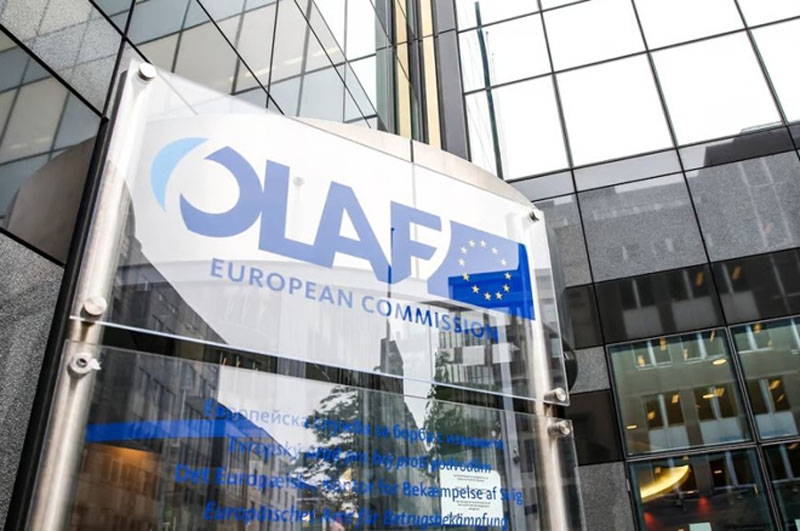Как Евросоюз будет использовать OLAF для контроля украинской власти


Хотя Украина еще не стала членом ЕС, но поскольку она получает из бюджета Евросоюза большие суммы, то обязалась признать над собой юрисдикцию его контролирующих органов
Европейская комиссия 17 июля дала положительную оценку первому регулярному траншу в размере около 4,2 млрд евро в рамках программы Ukraine Facility, направленной на поддержку макрофинансовой стабильности Украины и функционирования ее государственного управления. Общая сумма финансирования по этой программе должна составить 50 млрд евро до 2027 года.
Украина уже получила три транша в рамках Ukraine Facility: 4,5 млрд евро в марте, 1,5 млрд в апреле и 1,9 млрд в июне. Но это были не регулярные, а чрезвычайные транши, вызванные необходимостью срочно спасать нашу макрофинансовую стабильность. Теперь Евросоюз переходит к регулярным траншам, что означает «сначала реформы, затем деньги».
Платежи за реформы
9 июля Украина направила в Еврокомиссию запрос на получение первого регулярного транша, где отчиталась о выполнении девяти индикаторов второго квартала. Еврокомиссия 17 июля «пришла к выводу, что Украина удовлетворительно выполнила девять индикаторов реформ, связанных с первым регулярным платежом». В своем сообщении Еврокомиссия выделила три самые важные достижения: реформа Бюро экономической безопасности Украины; новые стандарты корпоративного управления для государственных предприятий; принятие Национального плана по энергетике и климату.
Теперь выделение денег должен утвердить Совет ЕС. «Несмотря на все трудности, Украина продвигает ключевые реформы для своего восстановления и продвижения по пути в ЕС. Это проложило путь к тому, чтобы Комиссия дала зеленый свет дополнительной выплате Украине около 4,2 млрд евро, и я надеюсь, что Совет теперь быстро согласится. ЕС будет продолжать поддерживать Украину столько, сколько потребуется», — заявила президент Еврокомиссии Урсула фон дер Ляйен.
Первый вице-премьер — министр экономики Юлия Свириденко сообщила, что Украина рассчитывает получить первый регулярный транш в сентябре, а через два месяца — еще один. «Мы искренне надеемся на положительную оценку и то, что сможем в сентябре получить эти необходимые средства, — анонсировала она. — В третьем квартале необходимо выполнить еще 9 индикаторов. И благодаря этому мы сможем получить дополнительные 4 млрд евро в ноябре этого года».
Впрочем, чтобы получить деньги, нужно выполнить еще одно условие. Оно связано не с реформами, а с контролем за расходованием европейской помощи.
Программа Ukraine Facility была утверждена Европейским советом, Европарламентом и Советом ЕС в феврале. А 20 марта министр финансов Украины Сергей Марченко и еврокомиссар по вопросам бюджета и управления Йоганнес Хан подписали в Брюсселе соглашение между Украиной и ЕС об участии Украины в программе ЕС по борьбе с мошенничеством.
Суть этого соглашения в том, что хотя Украина еще не стала членом ЕС, но поскольку она получает из бюджета Евросоюза большие суммы, то признает над собой юрисдикцию его органов в сфере контроля за расходованием средств.
21 июня Владимир Зеленский внес в Верховную Раду законопроект №0281 о ратификации этого соглашения. 8 июля евроинтеграционный комитет Рады рекомендовал депутатам принять этот закон.
В соглашении записано, что оно применяется с 1 января 2023 года. Это означает, что органы ЕС смогут проводить проверки всех физических и юридических лиц в Украине, которые распоряжались или пользовались финансированием от ЕС в 2023-м и последующих годах.
В приложении II к соглашению записано, что ЕС имеет право проводить технические, научные, финансовые и другие виды осмотра и аудита в помещении любого физического лица, которое проживает в Украине и управляет средствами ЕС, принимает участие в их использовании или пользуется ими, и любого юридического лица, которое создано в Украине и получает финансирование от ЕС. Такие осмотры и аудиты могут проводить представители учреждений и органов ЕС, в частности Еврокомиссии и Европейского суда аудиторов, и другие лица, уполномоченные Еврокомиссией. Эти представители «должны иметь надлежащий доступ к местам, работам и документам (как в электронной, так и в письменной форме) и ко всей информации, необходимой для проведения таких аудитов, включительно с правом на получение бумажной или электронной копии и извлечение из любого документа или содержимого любого носителя данных».
Европейский суд аудиторов (European Court of Auditors, ECA) — это одна из семи институций Евросоюза (наряду с Европарламентом, Европейским советом, Советом ЕС, Еврокомиссией, Судом ЕС и Европейским центральным банком), перечисленных в статье 13 договора о ЕС. Основная функция ECA заключается в аудиторской проверке того, что средства ЕС расходуются законно и с разумным управлением. Его штаб-квартира расположена в Люксембурге.
Еще более страшный орган, с точки зрения потенциальных расхитителей бюджетных средств, — это Европейское управление по борьбе с мошенничеством, известное как OLAF (аббревиатура французского названия Office européen de lutte anti-fraude). Его штаб-квартира расположена в Брюсселе. Разница между ECA и OLAF в том, что ECA проводит аудит (как наша Счетная палата), а OLAF осуществляет расследование. Для украинских деятелей, склонных к мошенничеству, OLAF может оказаться более серьезной угрозой, чем НАБУ, ГБР, БЭБ и СБУ.
В том же приложении II к соглашению записано, что Еврокомиссия и OLAF уполномочены на проведение административных расследований, включительно с выездными проверками и инспекциями, на территории Украины. Эти расследования могут проводиться в помещении любых физических лиц, проживающих в Украине, и юридических лиц, созданных в Украине, которые получают финансирование от ЕС. Если физическое или юридическое лицо оказывает сопротивление, государственные органы Украины обязаны помочь Еврокомиссии или OLAF провести выездную проверку или инспекцию, включая надлежащие превентивные меры для сохранения доказательств.
Если нарушения будут найдены, то Еврокомиссия будет налагать на юридических и физических лиц Украины штрафы, которые, как записано в приложении II, «подлежат принудительному исполнению в Украинке». А OLAF будет обращаться в прокуратуру ЕС. В приложении II говорится, что «государственные органы Украины сотрудничают с прокуратурой ЕС, чтобы обеспечить выполнение ею полномочий по проведению расследований, поддержке обвинений и привлечению к ответственности виновных и соучастников правонарушений, которые влияют на финансовые интересы ЕС».
В годовом отчете OLAF, опубликованном месяц назад, подведены итоги расследований этой организации в 2023 году: OLAF выявило мошенничества на более чем 1,2 млрд евро (в том числе рекомендовало вернуть в бюджет ЕС 1,04 млрд евро; предотвратило неправомерное расходование 209,4 млн евро из бюджета ЕС); открыло 190 новых расследований после 1178 предварительных анализов, проведенных экспертами OLAF; сообщило в прокуратуру ЕС о 79 случаях возможных уголовных преступлений.
В частности, OLAF расследовало обвинения в сговоре, манипулировании процедурами закупок, конфликте интересов и завышении счетов. Примеры расследований OLAF по защите денег налогоплательщиков ЕС охватывают все сферы расходов ЕС — от регионального финансирования до сельского хозяйства и исследований. OLAF провело расследования во всех государствах — членах ЕС и в третьих странах.
Теперь под юрисдикцию ECA и OLAF подпадет и Украина, включая программу Ukraine Facility. 22 мая Юлия Свириденко и еврокомиссар по вопросам европейской политики соседства и переговоров о расширении Оливер Варгеи подписали в Брюсселе рамочное соглашение между Украиной и ЕС о специальных механизмах реализации финансирования согласно инструменту Ukraine Facility. Оно уже ратифицировано Верховной Радой 6 июня.
Там записано, например, что Украина должна предоставлять агентам или представителям Еврокомиссии, OLAF, ECA и прокуратуры ЕС доступ к объектам и помещениям, где осуществляется реализация инвестиций и реформ, финансируемых в соответствии с этим соглашением, а также любых документов и компьютеризированных данных по управлению такими инвестициями и реформами. Украина также должна предоставлять Еврокомиссии, OLAF, ECA и прокуратуре ЕС полный и прямой доступ к любым национальным базам данных, которые являются релевантными для осуществления их мандата. Украина должна предоставлять OLAF информацию о банковских счетах, связанных с его расследованиями, и о банковских операциях.
Вместе эти два соглашения с Украиной (подписанные 20 марта и 22 мая) обеспечивают Евросоюзу возможности для эффективного контроля за расходованием в Украине европейской помощи. И это, пожалуй, не менее важный рычаг для воздействия на украинскую власть, чем ежеквартальные индикаторы реформ.
Recent Posts
Сбежавший в Швейцарию блогер Станислав Домбровский просит прощения у украинцев
Одесский трэш блогер Стас Домбровский, который в последнее время проживает в Швейцарии, записал видеообращение к…
Александра Устинова и атака на руководство АОЗ: что стоит за волной критики
Александра Устинова, народная депутат, которая в последние дни активно атакует Агентство оборонных закупок (АОЗ) возможно…
Журналисты показали имение киевской судьи, закрывшей дело Приходько
Свобода "под ключ" или манипуляция правосудием? Борис Приходько – нацбанкир времен Януковича и действующий нардеп…
Судьи вне закона
В течение последних трех лет внимание общественности если и бывает приковано к судам, то гораздо…
Артем Ляшанов и bill_line спасают репутацию через суд
Финтех-компания столкнулась с обвинениями в отмывании денег игорной мафии. ООО «Тех-Софт Атлас» (ТМ «bill_line») и…
Криптобиржа WhiteBIT: как Владимир Носов и «регионалы» Шенцевы отмывают деньги и помогают спецслужбам России
Владимир Носов в Украине пытается позиционировать себя как респектабельный бизнесмен и хозяин криптобиржи WhiteBIT. Однако…


